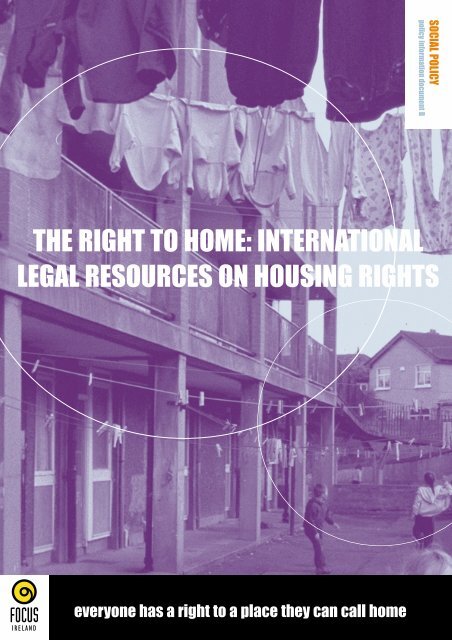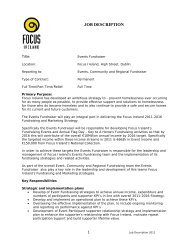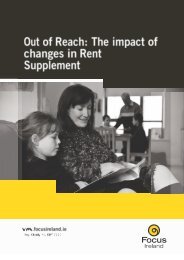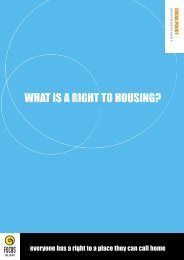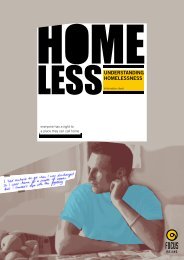Download this information leaflet here - Focus Ireland
Download this information leaflet here - Focus Ireland
Download this information leaflet here - Focus Ireland
Create successful ePaper yourself
Turn your PDF publications into a flip-book with our unique Google optimized e-Paper software.
SOCIAL POLICY<br />
policy <strong>information</strong> document B<br />
THE RIGHT TO HOME: INTERNATIONAL<br />
LEGAL RESOURCES ON HOUSING RIGHTS<br />
everyone has a right to a place they can call home
Policy Submissions<br />
This document sets out the<br />
international legal resources on<br />
housing rights that provide the<br />
basis of <strong>Focus</strong> <strong>Ireland</strong>’s demand<br />
that a right to housing be<br />
established under law in <strong>Ireland</strong>.<br />
Housing rights are entrenched in a number of international<br />
human rights instruments. The legal resources listed below<br />
— declarations, covenants and conventions — together form<br />
the body of international law recognising housing rights. In<br />
legal terms, the most powerful documents are called<br />
conventions, covenants or charters. They are legally binding<br />
treaties. Declarations and recommendations are also of vital<br />
importance, but are accorded less legal weight than<br />
conventions, covenants and charters. Here we have gat<strong>here</strong>d<br />
relevant excerpts from the following:<br />
United Nations:<br />
1. Universal Declaration of Human Rights.<br />
2. International Covenant on Economic, Social and<br />
Cultural Rights.<br />
3. Convention on the Elimination of All Forms of<br />
Racial Discrimination.<br />
4. Convention on the Elimination of All Forms of<br />
Discrimination Against Women.<br />
5. Convention on the Rights of the Child.<br />
European Union<br />
6. European Convention on Human Rights and<br />
Fundamental Freedoms.<br />
7. European Social Charter.<br />
UNITED NATIONS (UN)<br />
The Universal Declaration of Human Rights (UDHR)<br />
The Universal Declaration of Human Rights is the first<br />
major international agreement on human rights. It is<br />
considered to have been the inspiration to all subsequent<br />
human rights treaties. It is also the first human rights<br />
standard to recognise housing rights. Adopted and<br />
proclaimed by the General Assembly on 10 December<br />
1948, Article 25 of the UDHR enshrines a specific right for<br />
everyone to adequate housing:<br />
Article 25. Everyone has the right to a standard living<br />
adequate for the health and well-being of himself and of<br />
his family, including food, clothing, housing and medical<br />
care and necessary social services, and the right to<br />
security in the event of unemployment, sickness,<br />
disability, widowhood, old age or other lack of livelihood<br />
in circumstances beyond his control.<br />
International Covenant on Economic, Social and<br />
Cultural Rights (ICESCR)<br />
At the international level, the most significant articulation<br />
of the right to housing is found in the International<br />
Covenant on Economic, Social and Cultural Rights<br />
(ICESCR). The ICESCR became law on 3 January 1976 and<br />
is now legally binding on more than 140 countries. The<br />
right to adequate housing is found in article 11(1). This is<br />
the most legally significant universal codification provision<br />
recognising <strong>this</strong> right and has been subject to the greatest<br />
analysis, application and interpretation of all international<br />
legal sources of housing rights. Although the Covenant<br />
recognises the right to housing as a part of the larger right<br />
to an adequate standard of living, under international<br />
human rights law the right to adequate housing is<br />
understood as an independent or free-standing right. The<br />
Committee on Economic, Social and Cultural Rights<br />
(CESCR) is responsible for monitoring State party<br />
compliance with the Covenant.<br />
Article 11(1). The State parties to the present Covenant<br />
recognize the right of everyone to an adequate standard<br />
of living for himself and for his family, including<br />
adequate food, clothing and housing, and to the<br />
continuous improvement of living conditions. The<br />
States Parties will take appropriate steps to ensure the<br />
realisation of <strong>this</strong> right, recognising to <strong>this</strong> effect the<br />
essential importance of international co-operation based<br />
on free consent.
Convention on the Elimination of All Forms of<br />
Racial Discrimination (CERD)<br />
The Convention on the Elimination of All Forms of Racial<br />
Discrimination became law on 4 January 1969 and is<br />
currently legally binding on 158 countries. The UN Committee<br />
on the Elimination of All Forms of Racial Discrimination<br />
(CERD) monitors compliance with the Convention.<br />
Article 5(e)(iii). In compliance with the fundamental<br />
obligations laid down in article 2 of <strong>this</strong> Convention,<br />
State Parties undertake to prohibit and eliminate racial<br />
discrimination in all of its forma and to guarantee the<br />
right of everyone, without distinction as to race, colour,<br />
or national or ethnic origin to equality before the law,<br />
notability in the enjoyment of the following rights:…(e)<br />
in particular…(iii) the right to housing.<br />
Convention on the Elimination of All Forms of<br />
Discrimination Against Women (CEDAW)<br />
The Convention on the Elimination of All Forms of<br />
Discrimination Against Women (CEDAW) became law on 3<br />
September 1981 and is now legally binding on 163<br />
countries. The UN Committee on the Elimination of All<br />
Forms of Discrimination Against Women monitors State<br />
party compliance with the Convention.<br />
Article 14(2)(h). State Parties shall take all appropriate<br />
measures to eliminate discrimination against women in<br />
rural areas in order to ensure, on a basis of equality of<br />
men and women, that they participate in and benefit<br />
from rural development and, in particular, shall ensure<br />
to such women the right…(h) to enjoy adequate living<br />
conditions, particularly in relation to housing, sanitation,<br />
electricity and water supply, transport and<br />
communications.<br />
Convention on the Rights of the Child (CRC)<br />
The Convention on the Rights of the Child became law on 2<br />
September 1990 and is now legally binding on 191<br />
countries. The Committee on the Rights of the Child<br />
monitors State party compliance with the Convention.<br />
Article 27(3). State Parties in accordance with national<br />
conditions and within their means shall take<br />
appropriate measure to assist parents and others<br />
responsible for the child to implement <strong>this</strong> right and<br />
shall in the case of need provide material assistance<br />
and support programmes, particularly with regards to<br />
nutrition, clothing and housing.<br />
EUROPEAN UNION (EU)<br />
European Convention on Human Rights and<br />
Fundamental Freedoms (ECHR)<br />
T<strong>here</strong> are 41 State parties to the Convention. 38 countries<br />
have ratified the Protocol No.1. Thirty-one countries have<br />
ratified Protocol No. 4. Individual and group complaints<br />
alleging violations of the ECHR can be submitted to the<br />
European Court of Human Rights and Fundamental Freedoms.<br />
Article 8(1) states:<br />
Everyone has the right to respect for his private and family<br />
life, his home and his correspondence.<br />
Article 1 of Protocol No. 1 of the ECHR states:<br />
1(1) Every natural or legal person is entitled to the<br />
peaceful enjoyment of his possessions. No one shall be<br />
deprived of his possessions except in the public interest<br />
and subject to the conditions provided for by law and<br />
by the general principles of international law.<br />
1(2) The preceding provisions shall not, however, in any<br />
way impair the right of a State to enforce such laws as<br />
it deems necessary to control the use of property in<br />
accordance with the general interest or to secure the<br />
payment of taxes or other contributions or penalties.<br />
Article 2(1) of Protocol No. 4 of the ECHR states:<br />
2(1) Everyone lawfully within the territory of a State<br />
shall, within that territory, have the right to liberty of<br />
movement and freedom to choose his residence.<br />
European Social Charter<br />
The European Social Charter was adopted in 1961 and<br />
then revised and amended in 1996 to include Article 31 on<br />
housing rights. State compliance with <strong>this</strong> Charter is<br />
monitored by the European Committee of Independent<br />
Experts. Housing rights provisions are also found in articles<br />
16 and 19(4) of the Charter and within article 4 of the<br />
Additional Protocol to the Charter.<br />
Article 31 — The right to housing<br />
With a view to ensuring the effective exercise of the right to<br />
housing, the Parties undertake measures designed:<br />
• to promote access to housing of an adequate standard;<br />
• to prevent and reduce homelessness with a view to it’s<br />
gradual elimination;<br />
• to make the price of housing accessible to those<br />
without adequate resources.<br />
www.focusireland.org
<strong>Focus</strong> <strong>Ireland</strong>, 9-12 High Street, Dublin 8<br />
Tel: 01 8815900 Fax: 01 8815950<br />
www.focusireland.ie email: info@focusireland.ie


